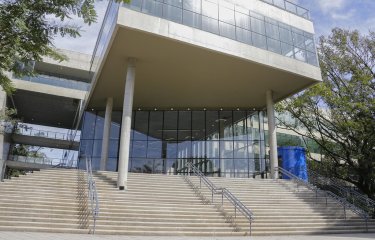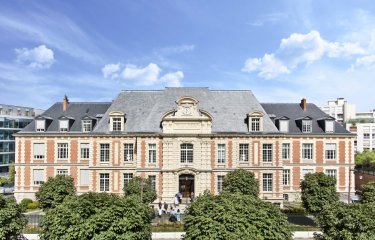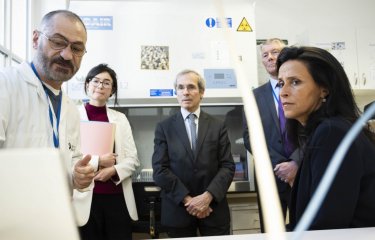The National Library of France (BnF) has awarded the 2019 Pasteur Vallery-Radot Prize to Institut Pasteur scientists Guillaume Duménil and Rogerio Amino. The winners were invited by BnF President Laurence Engel to receive their awards on June 13, 2019, at a ceremony held in the BnF Richelieu Library and attended by Daniel Louvard, a member of the French Academy of Sciences, and Stewart Cole, President of the Institut Pasteur. Here is a brief presentation of the two 2019 winners.

Rogerio Amino and Guillaume Duménil, June 13, 2019. Copyright: Aurélien Coustillac / Institut Pasteur
Rogerio Amino, Head of the Malaria Infection & Immunity Unit, in the Institut Pasteur (Paris)
Rogerio Amino obtained his PhD in Microbiology and Immunology from the Federal University of São Paulo in Brazil in 2002. He began his career as an Assistant Professor at the Federal University of São Paulo before joining the Institut Pasteur in Paris for the first Strategic Horizontal Program on Anopheles. His research focused on the malaria parasite, and he developed various in vivo imaging approaches that enabled him to describe new stages in the parasite life cycle in vertebrate host tissues.
After spending another three years teaching in Brazil, he returned to the Institut Pasteur in 2008 to continue his research. His work revealed an unsuspected development stage of the malaria parasite in the skin and various mechanisms by which the parasite evades or is kept in check by the immune system in the skin and the liver.
Since 2015, Rogerio Amino has led the Malaria Infection & Immunity Unit at the Institut Pasteur. His team's mission is to identify key molecular and cellular players involved in the parasite's survival in the skin and the liver, with the aim of developing a multi-antigen vaccine that hinders the parasite's progression and development in these tissues.
Learn more about the work of Rogerio Amino’s team
Guillaume Duménil, Head of the Pathogenesis of Vascular Infections Unit, in the Institut Pasteur (Paris)
Guillaume Duménil studies infections caused by meningococci, pathogenic gram-negative bacteria responsible for meningitis and septic shock. He employs a multidisciplinary approach combining microbiology, cell biology, vascular biology, innate immunity and physics to explore the mechanisms underpinning these infections. By observing clinical samples while also developing a humanized animal model, he demonstrated the importance of a process known as vascular colonization, during which meningococci fill the blood vessels, causing the vascular damage that characterizes infection. His research sheds light on the multiple stages of infection and the host-pathogen interactions that take place during vascular colonization. His identification of the bacterial factors involved in this process has resulted in the development of a promising therapeutic approach.
Guillaume Duménil is a scientist at Inserm. It was during his PhD in Philippe Sansonetti's laboratory at the Institut Pasteur that he first took a particular interest in infectious processes. He pursued his work in this area as a post-doctoral fellow in Ralph Isberg's laboratory in Boston before returning to France to join the unit led by Xavier Nassif at Necker Hospital. He then received an ATIP-Avenir grant and set up his own team in the Paris Cardiovascular Research Center at Georges Pompidou European Hospital. A successful ERC funding application enabled him to bring his team to the Institut Pasteur in 2015.
Learn more about the work of Guillaume Duménil’s team
The Pasteur Vallery-Radot Prize
Jacqueline Pasteur Vallery-Radot, the wife of Louis Pasteur's grandson, chose the National Library of France (BnF) as the residuary legatee of her estate. Under the terms of her will, the BnF awards two €16,000 prizes every year in consultation with the Institut Pasteur. Since 2007, these prizes have been awarded annually to two French Institut Pasteur scientists under the age of 50 who have led a major scientific project in the field of biology or physics/chemistry over the last five years, thus proving themselves to be worthy heirs of Pasteur himself. Winners are chosen by a panel of Institut Pasteur and French Academy of Sciences members, chaired by the Permanent Secretary of the French Academy of Sciences.
For more information, please visit





